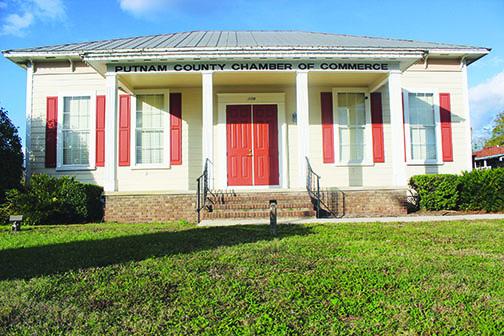Chamber officials: Measure important for getting economy back on track
Staff, wire reports
President Donald Trump signed an unprecedented $2.2 trillion economic rescue package into law Friday, after swift and near-unanimous action by Congress to support businesses, rush resources to overburdened health care providers and help struggling families during the deepening coronavirus epidemic.
Acting with unity and resolve unseen since the 9/11 attacks, Washington moved urgently to stem an economic free fall caused by widespread restrictions meant to slow the spread of the virus that have shuttered schools, closed businesses and brought American life in many places to a virtual standstill.
“This will deliver urgently needed relief,” Trump said as he signed the bill in the Oval Office, flanked only by Republican lawmakers. He thanked members of both parties for putting Americans “first.”
Officials with the Putnam County Chamber of Commerce said the aid package will be important for getting the economy back on track.
Chairman Charlie Douglas said the immediate checks will help residents, while businesses can also receive assistance.
Brian Bergen, the chamber’s vice president of economic development, said the ability for businesses to get loans is one of the most important pieces of the legislation.
“Bridge loans are useful because a lot of businesses are having no income because of the disaster,” Bergen said.
“Anytime you put cash in people’s pockets, they’re going to put it back in the economy. For every $1,000 spent, it could multiply up to $7,000. We call it the multiplier effect.”
Bergen said many chamber members remain positive about the local economy.
“People are still buying things and people are still doing business, they’re just doing it differently,” Bergen said. “Some of our businesses are very busy.
“Most people seem to be out there purchasing things.”
Earlier Friday, the House gave near-unanimous approval by voice vote after an impassioned session conducted along the social distancing guidelines imposed by the crisis. Many lawmakers sped to Washington to participate — their numbers swollen after a maverick Republican signaled he’d try to force a roll call vote — though dozens of others remained safely in their home districts. The Senate passed the bill unanimously late Wednesday, 96-0.
“Today we’ve all acknowledged our nation faces an economic and health emergency of historic proportions,” said House Speaker Nancy Pelosi, D-Calif. She said Americans deserve a full-on government response “to address these threats to their lives and their livelihood and they need it now.”
The $2.2 trillion legislation will speed government payments of $1,200 to most Americans and increase jobless benefits for millions of people thrown out of work. Businesses big and small will get loans, grants and tax breaks. It will send unprecedented billions to states and local governments, and the nation’s all but overwhelmed health care system.
“This is not a time for cynicism or invective or second-guessing,” said GOP Whip Liz Cheney of Wyoming. “This is a time to remember that we are citizens of the greatest nation on Earth, that we have overcome every challenge we have faced, and we will overcome this one.”
Despite reservations, arch conservatives joined with progressives like Alexandria Ocasio-Cortez, D-N.Y., to back the bill, which moved quickly through a Congress that’s been battered by partisanship and is itself not immune to the suffering the virus has caused. Reps. Joe Cunningham, D-S.C., and Mike Kelly, R-Pa., announced Friday that they’d tested positive, bringing the number of infected lawmakers to five.
Tea party Republicans said government orders to shutter businesses merited actions that conflict with their small-government ideology. Liberals accepted generous corporate rescues that accompany larger unemployment benefits, deferrals of student loans, and an enormous surge of funding for health care and other agencies.
“I’m going to have to vote for something that has things in it that break my heart,” said conservative Rep. David Schweikert, R-Ariz.
Many lawmakers summoned the bipartisan spirit of 9/11 and efforts to fight terrorism. Others praised the roles low-income workers play in keeping the country going and the heroism of health care workers. Some, like Iowa Democrat Abby Finkenauer, who had just learned of two additional coronavirus-related deaths in her district, came close to tears.
Others couldn’t restrain their partisan impulses. Republicans chided Democratic leaders for delays and provisions they see as extraneous, such as funding for public broadcasting and the arts; Democrats said too many elements are a bailout for corporations that may not need it.

